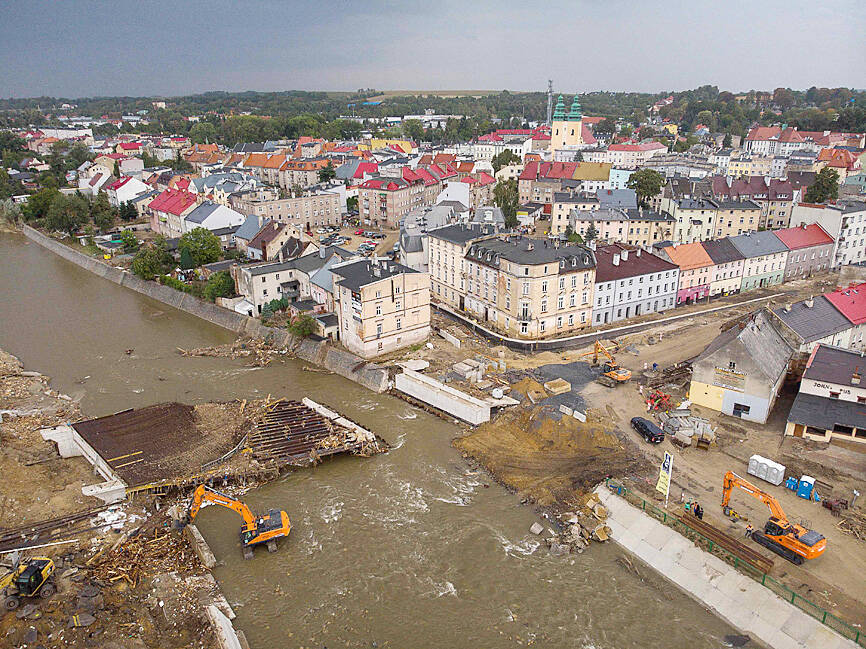Europe experienced its most extensive flooding in more than a decade last year, the EU’s climate change monitor reported yesterday, with almost one-third of its rivers swelling to bursting point.
Swathes of the continent were inundated during the year, with the worst hit Valencia in Spain, and central and eastern Europe, the Copernicus Climate Change Service said.
The disasters took place during the hottest year worldwide and underscore the threat that flooding poses for Europe, as the world warms because of human-driven climate change.

Photo: AFP
Storms and floods last year killed more than 300 people and affected 413,000 others across Europe, inflicting at least 18 billion euros (US$20.4 billion) in economic damage.
About 30 percent of Europe’s river network flooded in what was one of the continent’s 10 wettest years since 1950, Copernicus said in a report produced with the UN’s World Meteorological Organization.
“Europe saw the most widespread flooding since 2013,” Samantha Burgess of the European Centre for Medium-Range Weather Forecasts, which runs the Copernicus climate monitor, told journalists ahead of the report being published.
Up to three months of rain fell in just five days in September last year as Storm Boris brought immense flooding and widespread damage to eight nations in central and eastern Europe.
A month later, powerful storms whipped up by warm, moist air from the Mediterranean Sea dumped torrential rain over Spain, with subsequent floods devastating the eastern province of Valencia.
Most parts of western Europe experienced wetter-than-usual conditions last year, but eastern parts of the continent were on average drier and warmer.
Burgess said this east-west contrast was not directly linked to climate change, but opposite pressure systems that influenced cloud cover and the transport of moisture over different parts of the continent.
The storms that wreaked havoc over Europe were “likely more severe due to a warmer atmosphere holding more moisture,” she said.
“As our climate warms, we are seeing more — and more extreme — extreme events,” she added.
Since the 1980s, Europe has been warming twice as fast as the global average, making it the fastest-warming continent.
The Intergovernmental Panel on Climate Change says extreme rainfall and flooding is projected to get worse in Europe in particular as the planet keeps warming.

VAGUE: The criteria of the amnesty remain unclear, but it would cover political violence from 1999 to today, and those convicted of murder or drug trafficking would not qualify Venezuelan Acting President Delcy Rodriguez on Friday announced an amnesty bill that could lead to the release of hundreds of prisoners, including opposition leaders, journalists and human rights activists detained for political reasons. The measure had long been sought by the US-backed opposition. It is the latest concession Rodriguez has made since taking the reins of the country on Jan. 3 after the brazen seizure of then-Venezuelan president Nicolas Maduro. Rodriguez told a gathering of justices, magistrates, ministers, military brass and other government leaders that the ruling party-controlled Venezuelan National Assembly would take up the bill with urgency. Rodriguez also announced the shutdown

Civil society leaders and members of a left-wing coalition yesterday filed impeachment complaints against Philippine Vice President Sara Duterte, restarting a process sidelined by the Supreme Court last year. Both cases accuse Duterte of misusing public funds during her term as education secretary, while one revives allegations that she threatened to assassinate former ally Philippine President Ferdinand Marcos Jr. The filings come on the same day that a committee in the House of Representatives was to begin hearings into impeachment complaints against Marcos, accused of corruption tied to a spiraling scandal over bogus flood control projects. Under the constitution, an impeachment by the

Exiled Tibetans began a unique global election yesterday for a government representing a homeland many have never seen, as part of a democratic exercise voters say carries great weight. From red-robed Buddhist monks in the snowy Himalayas, to political exiles in megacities across South Asia, to refugees in Australia, Europe and North America, voting takes place in 27 countries — but not China. “Elections ... show that the struggle for Tibet’s freedom and independence continues from generation to generation,” said candidate Gyaltsen Chokye, 33, who is based in the Indian hill-town of Dharamsala, headquarters of the government-in-exile, the Central Tibetan Administration (CTA). It

A Virginia man having an affair with the family’s Brazilian au pair on Monday was found guilty of murdering his wife and another man that prosecutors say was lured to the house as a fall guy. Brendan Banfield, a former Internal Revenue Service law enforcement officer, told police he came across Joseph Ryan attacking his wife, Christine Banfield, with a knife on the morning of Feb. 24, 2023. He shot Ryan and then Juliana Magalhaes, the au pair, shot him, too, but officials argued in court that the story was too good to be true, telling jurors that Brendan Banfield set